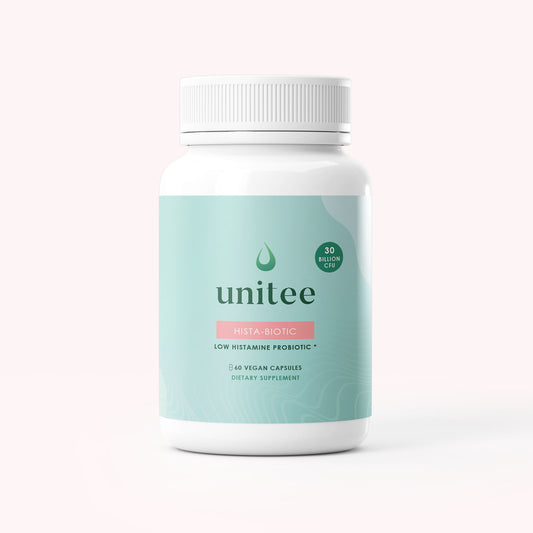When you’re following a low histamine diet, it’s important to include a variety of different food sources in your meals. By including diversity, you can ensure you get all of the nutritional needs your body uses to function.
There’s one problem. Everything seems to contain histamine, and getting more than a handful of foods into your diet seems like a mammoth task! Getting diversity doesn’t only feel difficult, it can seem downright impossible.
That’s why I’m here to help. Each time I get questions from my readers and clients, I try to address it so more people may be able to benefit from the information.
Today I’m going to break down salmon histamine content so you’ll know whether it’s a food you want to include in your diet or not!
Let’s dive right in…
Salmon Histamine Content: What the Research Says
Most resources will tell you to avoid salmon (and every other seafood product) at all costs when you’re living with histamine intolerance. While there’s a lot of truth in the fact seafood is generally on the higher histamine scale, it's not the whole picture.
The reason seafood contains more histamine is based on the decomposition of the flesh (1). Once the animal is killed, bacteria start the process of decomposition. As time goes by, the bacteria are more and more active, releasing compounds and gasses as they go to work. Some of these compounds are called biogenic amines, one of them being histamine.
In those without histamine intolerance, small amounts of histamine are neatly regulated by various processes in the body and they cause no symptoms. In those of you living with histamine intolerance, even small amounts of these biogenic amines will cause widespread and debilitating symptoms.
You may have also come across a condition called scombroid fish poisoning. It results in an allergic-like response by the body due to a dramatic increase in histamine found in the flesh of scombroid fish (2). It's referred to as a pseudoallergy as it’s not a true allergy like that which people experience with exposure to peanuts or bee stings, for example.
Salmon, however, is not a scombroid fish. This doesn’t mean it is completely histamine-devoid, however. Bacteria in the flesh can still produce histamine as the flesh degrades.
Great News! Salmon Histamine Content is Low (If You Follow This One Rule)
Ok, so if salmon histamine content builds up with increasing flesh decomposition, surely it means if you slow decomposition, histamine levels will be lower?
It sure does!
How do you slow decomposition, you ask? Well, you freeze the fish as soon as possible after the being is killed. Freezing inactivates the bacteria and preserves the flesh (3).
So, that ‘rule’ I mentioned? Buy frozen salmon to add to your low histamine diet! Not just any frozen salmon, wild-caught frozen salmon from a reputable dealer that can account for the timeline from catching to killing and freezing. Fortunately, there are many wild-caught sources of frozen salmon for you to choose from, simply look for suppliers in your area and ask them for their timeline!
Cooking frozen salmon is also easy. You can put the frozen salmon fillets straight into the oven to cook, baking at 425F/220C for 15 minutes covered, and then another 8-10 minutes uncovered. Be sure to allow the internal temperature of your salmon to reach at least 145F/63C to ensure doneness and prevent any nasty bacteria from being able to cause any issues.
It’s also important to eat your cooked salmon right away if you can, as continued exposure to air will start the process of decomposition leading to an increase in histamine and bacteria.
If you happen to have made a little extra, it’s often safe to keep in an airtight container at the back of the fridge and consumed within a day of cooking. Keeping it any longer may cause histamine and bacteria levels to build up.
Salmon Histamine Content: Four Major Benefits of Eating This Fish
Adding salmon to your low histamine diet will add loads of benefits.
1. Protein: Following a restricted diet can mean it’s hard to get enough protein, but it’s so important you do! Protein helps you to maintain muscle and strength, keep you satisfied and satiated, and maintains the health of your cells (4). Just 100g of salmon contains around 25g of protein, which is close to the suggested 30g per meal.
2. Omega 3 fatty acids: As a potent anti-inflammatory nutrient, omega 3s are an important part of your low histamine diet. Higher omega 3s have been shown to reduce the allergy cascade stimulated in the body in response to an allergen (5). Essentially, omega 3s appear to inhibit the release of inflammatory compounds involved in the production of allergy-like symptoms, and in doing so, lowers the body’s response to triggers. Getting your omega 3s from a whole food such as salmon can be a secret weapon in your toolkit to keep allergies at bay. You can also subsidize your anti-inflammatory omega 3s with supplements while you start trialing salmon in your diet.
3. Vitamin B12. There are two major reasons you need to get enough vitamin B12 in your diet. The first is because of how it ensures the smooth functioning of your nervous system. Without enough B12, you may experience loss of sensation, feel weak and tired, experience headaches, and have memory lapses or feel confused. The second reason to make an effort to get enough B12 in your diet is for the health of your red blood cells. As you may already know, they contain iron that carries oxygen to your tissues. But, did you know, vitamin B12 is just as important for this function? Without it, your blood cells aren’t able to get to the stage in their development to make use of the iron. Without enough B12 or iron, it results in a condition called anemia. 100g of salmon contains almost 130% of your daily required intake of vitamin B12!
4. Potassium. When living with histamine intolerance, it’s common to experience low blood pressure of hypotension as a result of widespread blood vessel relaxation (6). Getting enough potassium in your diet can help to keep your blood pressure under control, reducing the symptoms such as light headedness and dizziness experienced with episodes of low blood pressure. Salmon contains a small but essential dose of your daily required amount of potassium.
Additionally, salmon will provide you with a small amount of other forms of B vitamins, some important minerals, healthy fats as well as antioxidant compounds.
Now you know how beneficial salmon is for your health, and salmon histamine content being low, you can make an informed decision about whether you’d like to add it to your low histamine diet.
If you haven’t eaten salmon since discovering you’re histamine intolerant, it’s best to try a small amount with an otherwise well-tolerated low histamine meal. Eat 1-2 tablespoons and wait three days to determine your reaction before you add any more. If you experience no symptoms, it’s safe to add progressively larger amounts of salmon to your diet.
Always listen to your body, and don’t overdo it! Going back to the start of our conversation: diversity in your diet is key. Use my comprehensive food list to ensure a full nutritious diet while going low histamine.
References:
1. Madejska A, Pawul-Gruba M, Osek J. Histamine Content in Selected Production Stages of Fish Products. J Vet Res. 2022;66(4):599-604.
2. Eyer-Silva WA, Arteaga Hoyos VP, Nascimento L. Scombroid Fish Poisoning. Am J Trop Med Hyg.
3. USDA. Food Safety and Inspection Service. Freezing and Food Safety. 2024.
4. Zhang P. The Role of Diet and Nutrition in Allergic Diseases. Nutrients. 2023;15(17):3683.
5. Ahmed N, Barrow CJ, Suphioglu C. Exploring the Effects of Omega-3 and Omega-6 Fatty Acids on Allergy Using a HEK-Blue Cell Line. Int J Mol Sci. 2016;17(2):220.
6. Blom, J., Yang, P., Nicholson, N., et al. A method for determining whether hypotension caused by novel compounds in preclinical development results from histamine release. Journal of Pharmacological and Toxicological Methods. 2004. 49(1):31-37.

Anita Tee
My name is Anita Tee. I'm a nutritional scientist who specializes in histamine intolerance. I hold a Master of Science in Personalized Nutrition and a Bachelor of Science in Human Biology and Psychology.
For the past ten years, I have used my experience in nutritional and medical health sciences to create a scientifically backed, natural approach to healthcare that relies 100% on evidence-based research.
As I previously suffered from - and overcame - histamine intolerance, my focus is to increase recognition and expand the available resources and protocols available for resolving this particular disorder. To date, I have helped over 4,000 individuals fully resolve or better manage their histamine intolerance symptoms.









